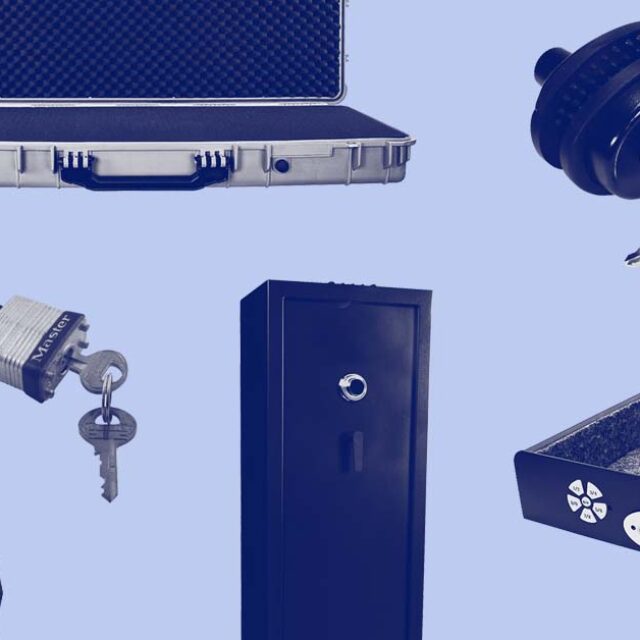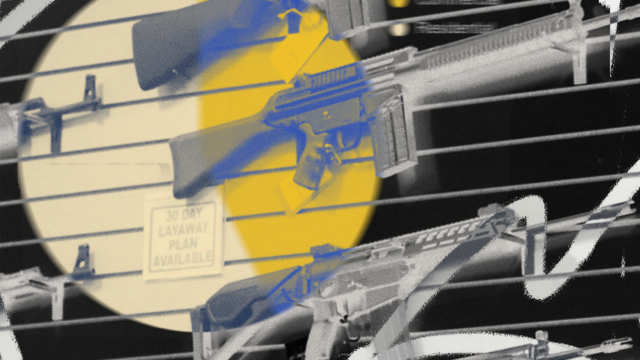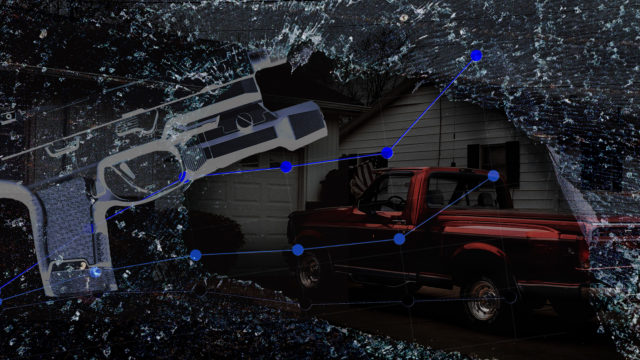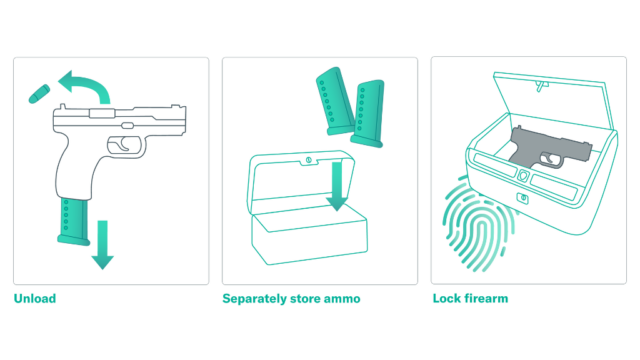Report Lost and Stolen Guns
Report Lost and Stolen Guns
What does this solve?
Hundreds of thousands of guns are lost or stolen from private gun owners, gun dealers, or shipping companies every year. Requiring that lost and stolen guns be reported to law enforcement deters illegal gun trafficking. The reporting of these guns allows the police to respond more quickly to gun thefts and helps them identify tracking patterns.
Stolen guns are often diverted into an underground market where people with dangerous histories are able to easily obtain firearms.1Philip J. Cook, “Gun Markets,” Annual Review of Criminology 1 (2018): 359–77, https://doi.org/10.1146/annurev-criminol-032317-092149; ATF, “National Firearms Commerce and Trafficking Assessment (NFTCA), Volume II: Crime Gun Intelligence and Analysis—Part V: Firearm Thefts,” January 2023, https://www.atf.gov/firearms/docs/report/nfcta-volume-ii-part-v-firearm-thefts/download. Lost and stolen guns have been recovered at the scenes of violent crimes,2Brian Freskos, “Missing Pieces: Gun Theft From Legal Gun Owners is on the Rise, Quietly Fueling Violent Crime,” The Trace, November 20, 2017, https://www.thetrace.org/2017/11/stolen-guns-violent-crime-america/. shootings on school grounds, and unintentional shootings by children. Passing laws requiring gun owners to report guns that have been lost or stolen to law enforcement can help prevent illegal gun trafficking and gun violence.
How it Works
Reporting lost or stolen guns may reduce underground gun sales and illegal gun trafficking.
Federal law requires firearm dealers to report firearms that are lost or stolen from their inventory to local authorities and to the Bureau of Alcohol, Tobacco, Firearms, and Explosives (ATF).118 U.S.C. 923(g)(6); 27 CFR 478.39a and 479.141; Bureau of Alcohol, Tobacco, Firearms, and Explosives, “Report Firearms Theft or Loss: Reporting for Federal Firearms Licensees,” September 23, 2022, https://www.atf.gov/firearms/report-firearms-theft-or-loss. Although more than 95 percent of stolen guns come from thefts from private gun owners,2ATF, “National Firearms Commerce and Trafficking Assessment (NFTCA), Volume II: Crime Gun Intelligence and Analysis—Part V: Firearm Thefts,” January 2023, https://www.atf.gov/firearms/docs/report/nfcta-volume-ii-part-v-firearm-thefts/download. with the exception of weapons registered under the National Firearms Act, federal law does not require gun owners to report lost or stolen firearms to law enforcement.
Laws requiring that lost and stolen guns be reported to law enforcement are associated with significant reductions in gun trafficking. One study found that these laws reduced traced illegal gun movement by 46 percent compared to states that do not have such laws.3Leo H. Kahane, “Understanding the Interstate Export of Crime Guns: A Gravity Model Approach,” Contemporary Economic Policy 31, no. 3 (2012): 618–34, https://doi.org/10.1111/j.1465-7287.2012.00324.x. Another study found that mandatory-reporting laws were associated with a 30 percent lower risk that guns would be purchased in that state and recovered after a crime in another state.4Daniel W. Webster et al., “Preventing the Diversion of Guns to Criminals Through Effective Firearm Sales Laws,” in Reducing Gun Violence in America: Informing Policy with Evidence and Analysis, (Baltimore, MD: The Johns Hopkins University Press, 2013): 109–21, https://bit.ly/3Ic334l. In addition to other policies to help prevent gun theft, including requiring secure gun storage at home and in vehicles and promoting public awareness of the benefits of secure storage, lawmakers should pass laws to affirmatively require gun owners to report lost or stolen firearms to law enforcement for investigation immediately when they go missing.
By the numbers
>200,000
On average, more than 200,000 guns are stolen from private gun owners each year.
9
On average, at least one gun is stolen from a car every nine minutes in the United States.
46%
One study found that lost and stolen reporting laws reduced traced illegal gun movement by 46 percent compared to states that do not have such a law.
>34,000
Between 2017 and 2021, there were 5,395 reported incidents of theft from licensed gun dealers, resulting in 34,339 firearms stolen.
Which states require reporting of lost and stolen guns?
17 states have adopted this policy
Lost and Stolen Reporting
Alabama has not adopted this policy
Lost and Stolen Reporting
Alaska has not adopted this policy
Lost and Stolen Reporting
Arizona has not adopted this policy
Lost and Stolen Reporting
Arkansas has not adopted this policy
Lost and Stolen Reporting
California has adopted this policy
Lost and Stolen Reporting
Colorado has adopted this policy
Lost and Stolen Reporting
Connecticut has adopted this policy
Lost and Stolen Reporting
Delaware has adopted this policy
Lost and Stolen Reporting
Florida has not adopted this policy
Lost and Stolen Reporting
Georgia has not adopted this policy
Lost and Stolen Reporting
Hawaii has adopted this policy
Lost and Stolen Reporting
Idaho has not adopted this policy
Lost and Stolen Reporting
Illinois has adopted this policy
Lost and Stolen Reporting
Indiana has not adopted this policy
Lost and Stolen Reporting
Iowa has not adopted this policy
Lost and Stolen Reporting
Kansas has not adopted this policy
Lost and Stolen Reporting
Kentucky has not adopted this policy
Lost and Stolen Reporting
Louisiana has not adopted this policy
Lost and Stolen Reporting
Maine has not adopted this policy
Lost and Stolen Reporting
Maryland has adopted this policy
Lost and Stolen Reporting
Massachusetts has adopted this policy
Lost and Stolen Reporting
Michigan has adopted this policy
Lost and Stolen Reporting
Minnesota has not adopted this policy
Lost and Stolen Reporting
Mississippi has not adopted this policy
Lost and Stolen Reporting
Missouri has not adopted this policy
Lost and Stolen Reporting
Montana has not adopted this policy
Lost and Stolen Reporting
Nebraska has not adopted this policy
Lost and Stolen Reporting
Nevada has not adopted this policy
Lost and Stolen Reporting
New Hampshire has not adopted this policy
Lost and Stolen Reporting
New Jersey has adopted this policy
Lost and Stolen Reporting
New Mexico has not adopted this policy
Lost and Stolen Reporting
New York has adopted this policy
Lost and Stolen Reporting
North Carolina has not adopted this policy
Lost and Stolen Reporting
North Dakota has not adopted this policy
Lost and Stolen Reporting
Ohio has adopted this policy
Lost and Stolen Reporting
Oklahoma has not adopted this policy
Lost and Stolen Reporting
Oregon has adopted this policy
Lost and Stolen Reporting
Pennsylvania has not adopted this policy
Lost and Stolen Reporting
Rhode Island has adopted this policy
Lost and Stolen Reporting
South Carolina has adopted this policy
Lost and Stolen Reporting
South Dakota has not adopted this policy
Lost and Stolen Reporting
Tennessee has not adopted this policy
Lost and Stolen Reporting
Texas has not adopted this policy
Lost and Stolen Reporting
Utah has not adopted this policy
Lost and Stolen Reporting
Vermont has not adopted this policy
Lost and Stolen Reporting
Virginia has adopted this policy
Lost and Stolen Reporting
Washington has adopted this policy
Lost and Stolen Reporting
West Virginia has not adopted this policy
Lost and Stolen Reporting
Wisconsin has not adopted this policy
Lost and Stolen Reporting
Wyoming has not adopted this policy
Myth & Fact
Myth
Lost and stolen reporting laws only re-victimize and penalize gun owners when the focus should be on criminals.
Fact
Most lost and stolen reporting laws only have consequences to gun owners who fail to alert law enforcement when their guns are lost or stolen. Lost and stolen reporting laws are associated with a 30 percent lower risk that guns would be purchased in that state and recovered after a crime in another state.1Daniel W. Webster et al., “Preventing the Diversion of Guns to Criminals Through Effective Firearm Sales Laws,” in Reducing Gun Violence in America: Informing Policy with Evidence and Analysis, (Baltimore, MD: The Johns Hopkins University Press, 2013): 109–21, https://bit.ly/3Ic334l.
Featured Resources

Stolen Guns Pose a Tremendous Risk to Public Safety
Thousands of guns are stolen every year and often wind up at crime scenes. Stolen guns pose a tremendous risk to public safety.

Gun Thefts from Cars: The Largest Source of Stolen Guns
On average, at least one gun is stolen from a car every nine minutes in the United States. Secure storage can prevent gun thefts.

Guide to Secure Gun Storage Devices
Secure gun storage can prevent theft and access by children, unauthorized users, and anyone who may pose a danger to themself or others.
All Resources
Report Lost and Stolen Guns
All Resources
The Smoking Gun
An online resource committed to exposing the gun industry’s role in our gun violence epidemic today.
Everytown Research & PolicyInside the Gun Shop: Firearms Dealers and Their Impact
This report spells out the basic facts about licensed dealers and the relationship between these dealers and gun crimes.
Report
Be SMART
The Be SMART campaign raises awareness about how secure gun storage can save children’s lives.
Initiative
Gun Thefts from Cars: The Largest Source of Stolen Guns
Gun thefts from cars are the largest source of stolen guns—one that continues rising in parallel with rates of gun sales and violence.
Everytown Research & Policy
Robos de armas en vehículos: la fuente más grande de armas robadas
Una investigación de Everytown for Gun Safety Support Fund revela que los robos de armas en vehículos son la mayor fuente de armas robadas.
Everytown Research & Policy
Unload, Lock, and Separate: Secure Gun Storage Practices to Reduce Violence
Secure gun storage practices should include unloading the ammunition, locking the gun, and storing it and ammunition in separate locations.
Fact Sheet

